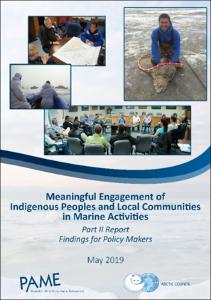Meaningful engagement of Indigenous Peoples and Local Communities in marine activities. Part II Report: Findings for Policy Makers.

View/
Average rating
votes
Date
2019Corporate Author
Protecton of the Arctic Marine Environment
Arctic Council
Status
PublishedPages
55pp.
Metadata
Show full item recordAbstract
Indigenous peoples and local communities living in coastal communities in the Arctic have
always depended on the sea for food, transportation, cultural and spiritual identity and social
well-being. Increasingly, the sea is being shared with additional human-driven activities.
These include industrial projects, marine management, scientific research, shipping,
emergency response and tourism.
All of these undertakings may affect people in Indigenous and local communities. Involving
residents in such activities and engaging meaningfully with them is an ongoing process that
builds a foundation on which problems can be solved or managed.1, 2 The increase in humandriven
activities in the Arctic provides more instances and opportunities for regular
meaningful engagement to build a strong foundation.
The term “meaningful engagement” has no single definition. Nor does it have a one-size-fitsall
approach for all activities. Meaningful engagement is understood to include a range of
pr.....
Publisher
Protection of the Arctic Marine Environment (PAME)Akureyri, Norway
Document Language
enSustainable Development Goals (SDG)
14.aMaturity Level
MatureSpatial Coverage
Arctic RegionCitation
Protection of the Arctic Marine Environment (2019) Meaningful Engagement of Indigenous Peoples and Local Communities in Marine Activities. Part II Report: Findings for Policy Makers. Akureyri, Iceland, Protection of the Arctic Marine Environment, 55pp. DOI: http://dx.doi.org/10.25607/OBP-1759Collections
- CAPARDUS Practices [244]
 Repository of community practices in Ocean Research, Applications and Data/Information Management
Repository of community practices in Ocean Research, Applications and Data/Information Management